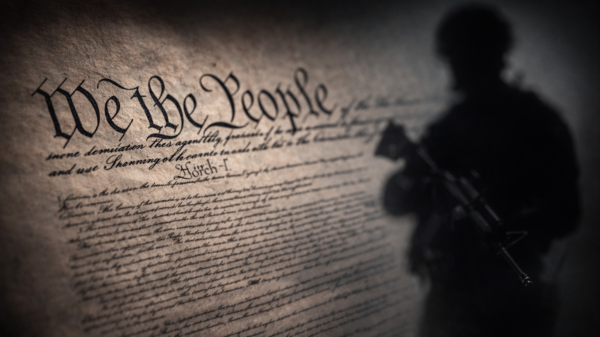Alabama stands at a political and moral tipping point, and what happens next will decide whose freedoms survive. A radical minority—small in number but ruthless in method—is using the Legislature’s supermajority to force through laws that do far more than set budgets or adjust regulations. They invade the most intimate spaces of life—what our children can learn, who makes decisions over our bodies, and which freedoms we are permitted to keep.
This is not the Republican Party that won control of the State House in 2010. Back then, the pitch was transparency, ethics and economic growth. Today, it’s about control—political, cultural and personal. And while this MAGA faction represents only a fraction of the party, they have mastered the art of primaries, ensuring their grip on the levers of power.
History teaches us that entrenched authority rarely surrenders willingly—and the cost of resistance has always been steep. In November 1917, suffragists arrested for peacefully picketing the White House were sent to Occoquan Workhouse, where they endured what became known as the “Night of Terror.” Guards hurled them into dark cells, twisted their arms, smashed their heads against iron beds, and left them without food or water. Dora Lewis was knocked unconscious when she was thrown into her cell, and Alice Cosu suffered a heart attack believing Lewis had been killed.
Lucy Burns was shackled to the bars with her hands above her head all night. She was not alone in her defiance. Along with Alice Paul, Dora Lewis and others, Burns began a hunger strike to protest their treatment and demand recognition as political prisoners. Their response was brutal: force-feeding through tubes rammed down their throats, their heads held still, their bodies wracked with pain.
Their so-called crime: demanding the right to vote. Christabel Pankhurst told women of her day, “Do not appeal, do not beg… take courage, join hands, fight with us.” Susan B. Anthony declared, “Woman must not depend upon the protection of man… but must be taught to protect herself.” The same willingness to brutalize women for demanding a voice still lurks in today’s politics—it’s just better dressed.
A decade earlier, coal miners in West Virginia and Alabama—men who labored underground for poverty wages in lethal conditions—struck for fair pay and safety. Instead of negotiation, they were met with violence. Company thugs and deputized lawmen raided tent camps, beat miners and their families, and opened fire. Families were evicted in winter, dumped into snow with their belongings as their children cried from the cold. Labor organizer Mother Jones, bereft of her own children, told them simply: “Pray for the dead and fight like hell for the living.”
These were not abstract political battles—they were flesh-and-blood struggles against those who believed their power was absolute. The people who resisted did so knowing they might be jailed, beaten or worse. They understood a truth we risk forgetting: power yields nothing without a demand, and that demand often comes at a price.
As long as they keep us locked in skirmishes with one another, our eyes will never lift to see the true enemy—the hands in our pockets, the pens rewriting the rules, the quiet architects of a system designed to keep power where it is—and the people where they are.
The same arrogance that once sent women to dark cells and miners into the snow now stalks the Capitol, dressed in tailored suits and carrying committee gavels. We face an assault just as cruel—deliberate, calculated and aimed at rewriting the very rules that have guided this republic through war and peace, prosperity and hardship. In Washington, D.C., the institutions built to check ambition and guard liberty are being hollowed out. Weak leaders in both the House and Senate, allied with ideological zealots, are dismantling the checks and balances designed to endure even when elected officials betray their oath.
This is not conjecture. It is happening amidst dangerous strategies of disinformation and the steady erosion of democratic norms—tactics once envisioned by Soviet strategists and now deployed from within. As Nikita Khrushchev warned in 1956, “We will take America without firing a shot… We will destroy you from within.” That threat was never about armies crossing borders—it was about the slow rot of trust, integrity and law, eaten away from the inside.
Today, those same tools—propaganda, manufactured division, capture of public institutions—are being wielded by the unscrupulous, aided by feckless leadership unwilling to push back. The rot is quiet, methodical, and far more dangerous than any overt assault. The 2026 elections are shaping up not as routine contests, but as existential tests—whether Alabama and the nation will continue being governed by a radical few, or whether we will cling to the idea that democracy means power for the many.
And make no mistake: the right to vote itself is still a target. Recently, Defense Secretary Pete Hegseth publicly aligned himself with Doug Wilson, a Christian nationalist pastor who believes women should no longer be allowed to vote. Wilson sees women as subservient to men and has said that in his ideal Christian society, they would be denied the ballot. Hegseth, according to a Pentagon spokesman, “very much appreciates many of Mr. Wilson’s writings and teachings.”
It should chill every American to see someone charged with defending the nation’s freedoms embrace a man who would strip half the population of theirs. The suffragists who endured prison, beatings and force-feedings fought so that women could participate fully in American democracy. A century later, to hear powerful voices entertain undoing that victory is proof that no right is ever beyond the reach of those who would take it back.
Resistance today demands more than outrage. It demands organizing—across party lines, across counties, across every ploy meant to divide and distract us. It means showing up at town halls, school boards and the ballot box until power has no choice but to listen. If suffragists endured beatings and force-feedings for the right to vote, if miners stood down armed guards for a fair day’s wage, if civil rights activists faced fire hoses and billy clubs to secure equal treatment under the law—then surely we can summon the resolve to resist a radical minority determined to define our lives in secret committees and signed bills.
Because if we fail, the future will not remember us as the generation that defended the Republic. It will remember us as the ones who looked away—until the ballot was gone, the voice was silenced, and the door to our own freedom closed behind us.
That is not hyperbole. It is the lesson written in our own history. Power, once surrendered, is rarely returned. Rights, once stripped, are clawed back only through struggle. And those who would take them know this well—they count on fatigue, on distraction, on our willingness to believe that someone else will fight the fight.
They are wrong. History is written by the few only when the many surrender their voice. Every generation is handed a pen—some use it to sign away rights, others to demand them. Ours is in our hand now, and the ink is still wet. What we do next will decide whether the story of this Republic ends in surrender… or in the defiance of a people who refused to be ruled. In the America some now imagine, The Handmaid’s Tale is a documentary.
We must prove them wrong.














































